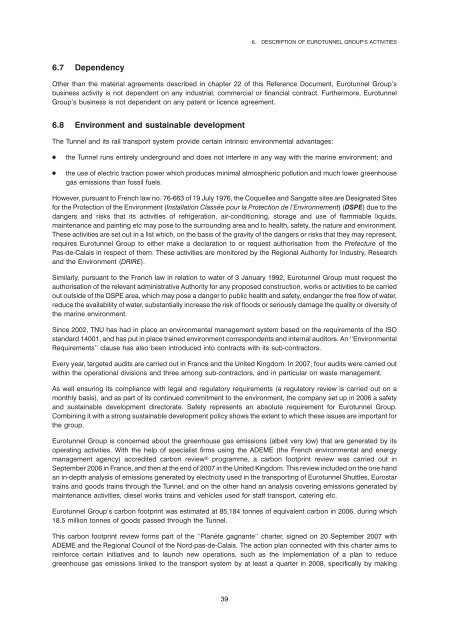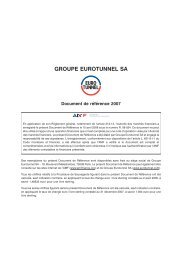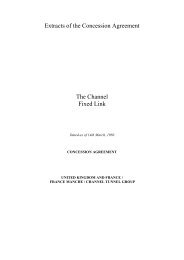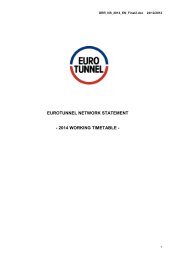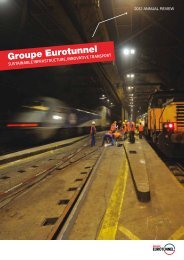2007 Reference Document for Groupe Eurotunnel SA PDF file size
2007 Reference Document for Groupe Eurotunnel SA PDF file size
2007 Reference Document for Groupe Eurotunnel SA PDF file size
You also want an ePaper? Increase the reach of your titles
YUMPU automatically turns print PDFs into web optimized ePapers that Google loves.
6. DESCRIPTION OF EUROTUNNEL GROUP’S ACTIVITIES6.7 DependencyOther than the material agreements described in chapter 22 of this <strong>Reference</strong> <strong>Document</strong>, <strong>Eurotunnel</strong> Group’sbusiness activity is not dependent on any industrial, commercial or financial contract. Furthermore, <strong>Eurotunnel</strong>Group’s business is not dependent on any patent or licence agreement.6.8 Environment and sustainable developmentThe Tunnel and its rail transport system provide certain intrinsic environmental advantages:the Tunnel runs entirely underground and does not interfere in any way with the marine environment; andthe use of electric traction power which produces minimal atmospheric pollution and much lower greenhousegas emissions than fossil fuels.However, pursuant to French law no. 76-663 of 19 July 1976, the Coquelles and Sangatte sites are Designated Sites<strong>for</strong> the Protection of the Environment (Installation Classée pour la Protection de l’Environnement) (DSPE) due to thedangers and risks that its activities of refrigeration, air-conditioning, storage and use of flammable liquids,maintenance and painting etc may pose to the surrounding area and to health, safety, the nature and environment.These activities are set out in a list which, on the basis of the gravity of the dangers or risks that they may represent,requires <strong>Eurotunnel</strong> Group to either make a declaration to or request authorisation from the Prefecture of thePas-de-Calais in respect of them. These activities are monitored by the Regional Authority <strong>for</strong> Industry, Researchand the Environment (DRIRE).Similarly, pursuant to the French law in relation to water of 3 January 1992, <strong>Eurotunnel</strong> Group must request theauthorisation of the relevant administrative Authority <strong>for</strong> any proposed construction, works or activities to be carriedout outside of the DSPE area, which may pose a danger to public health and safety, endanger the free flow of water,reduce the availability of water, substantially increase the risk of floods or seriously damage the quality or diversity ofthe marine environment.Since 2002, TNU has had in place an environmental management system based on the requirements of the ISOstandard 14001, and has put in place trained environment correspondents and internal auditors. An ‘‘EnvironmentalRequirements’’ clause has also been introduced into contracts with its sub-contractors.Every year, targeted audits are carried out in France and the United Kingdom. In <strong>2007</strong>, four audits were carried outwithin the operational divisions and three among sub-contractors, and in particular on waste management.As well ensuring its compliance with legal and regulatory requirements (a regulatory review is carried out on amonthly basis), and as part of its continued commitment to the environment, the company set up in 2006 a safetyand sustainable development directorate. Safety represents an absolute requirement <strong>for</strong> <strong>Eurotunnel</strong> Group.Combining it with a strong sustainable development policy shows the extent to which these issues are important <strong>for</strong>the group.<strong>Eurotunnel</strong> Group is concerned about the greenhouse gas emissions (albeit very low) that are generated by itsoperating activities. With the help of specialist firms using the ADEME (the French environmental and energymanagement agency) accredited carbon review programme, a carbon footprint review was carried out inSeptember 2006 in France, and then at the end of <strong>2007</strong> in the United Kingdom. This review included on the one handan in-depth analysis of emissions generated by electricity used in the transporting of <strong>Eurotunnel</strong> Shuttles, Eurostartrains and goods trains through the Tunnel, and on the other hand an analysis covering emissions generated bymaintenance activities, diesel works trains and vehicles used <strong>for</strong> staff transport, catering etc.<strong>Eurotunnel</strong> Group’s carbon footprint was estimated at 85,184 tonnes of equivalent carbon in 2006, during which18.5 million tonnes of goods passed through the Tunnel.This carbon footprint review <strong>for</strong>ms part of the ‘‘Planète gagnante’’ charter, signed on 20 September <strong>2007</strong> withADEME and the Regional Council of the Nord-pas-de-Calais. The action plan connected with this charter aims torein<strong>for</strong>ce certain initiatives and to launch new operations, such as the implementation of a plan to reducegreenhouse gas emissions linked to the transport system by at least a quarter in 2008, specifically by making39


